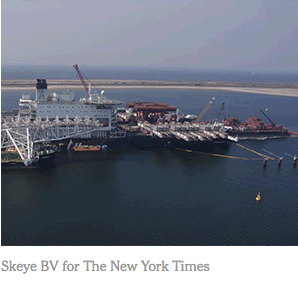Moored off the port of Rotterdam, Netherlands, Pioneering Spirit looms so large that it is difficult to recognize as a ship. The crew of 450 is dwarfed by the cranes and pipes that dominate the sprawling layers of decks.
For decades, Edward Heerema, head of Allseas, the Swiss-based energy services company, dreamed of building a giant vessel to install oil platforms offshore. But the Pioneering Spirit has found another purpose: dismantling oil fields in the British North Sea.
With oil prices dropping sharply in the last two years, Mr. Heerema said he was now just focused on finding enough work to meet his payroll. “I can’t say how long it will take to pay for itself. Maybe 10 years, maybe 30 years,” he said of the ship.
The British North Sea was once a crucial source of oil for the world. At its peak in 1999, it produced about 2.9 million barrels of oil a day, more than Kuwait or Iraq at the time.
Since then, production has generally been in a long slide as oil fields discovered decades ago are exhausted and high costs discourage new exploration. Its diminishing fortunes have been cemented by the rise of renewables and the push for cleaner alternatives to oil.
“It is one of those signs that we may be at a tipping point,” said Anthony Hobley, chief executive of Carbon Tracker, a nonprofit group that studies the investment risks of the shifting energy landscape. “We may well be at that critical point in history where people will say that this is the point where the oil industry reached its peak and began to decline.”




